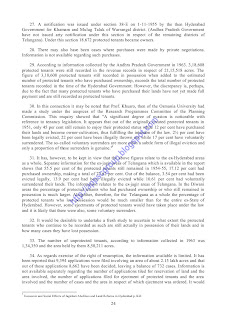Classification of Indian Soils
- There are 8 major group of soils in India which are furnished below
Red Soils
- Red colour is due to various oxides of iron. They are poor in N, P, K and with pH varying 7 to 7.5. These soils are light textured with porous structure. Lime is absent with low soluble salts.
- Red soils occurs extensively in Andhra Pradesh , Assam, Bihar, Goa, Parts of kerala, Maharastra, Karnataka, Tamilnadu and West Bengal. Most of the red soils have been classified in the order ' Alfisols'.
Lateritic Soils
- Seen in high rainfall areas, under high rainfall conditions silica is released and leached down wards and the upper horizons of soils become rich in oxides of iron and alluminium. The texture is light with free drainage structure.
- Clay is predominant and lime is deficient. pH 5 to 6 with low in base exchange capacity, contained more humus and are well drained. They are distributed in summits of hills of Daccan karnataka, Kerala, Madhyapradesh, Ghat regions of Orissa, Andhra pradesh, Maharastra and also in West Bengal, Tamilnadu and Assam.
- Most of the laterite soils have bee classified in the order ' ultisols' and a few under ' oxisols'.
Alluvial Soils
- These are the most important soils from the agriculture point of view. The soils are sandy loam to clay loam with light grey colour to dark colour, structure is loose and more fertile. But the soils are low in NPK and humus.
- They are well supplied with lime; base exchange capacity is low, pH ranges from 7 to 8. These soils are distributed in Indo-Gangetic plains, Brahmaputra valley and all most all states of North and South. Most of the alluvial soils have been classified in the orders ' Entisols', ' Inceptisols' and ' Alfisols'.
Black Soils
- This is well known group of soils characterised by dark grey to black colour with high clay content.
- They are neutral to slightly alkaline in reaction. Deep cracks develop during summer, the depth of the soil varies from less than a meter to several meters. Poor free drainage results in the soils, base exchange is high with high pH and rich in lime and potash. Major black soils are found in Maharastra, Madhyapradesh, Gujarat and Tamilnadu.
- Cotton is most favourable crop to be grown in these soils. These soils are classified in the order 'Entisols', ' Inceptisols' and ' vertisols'.
Advertisements

































